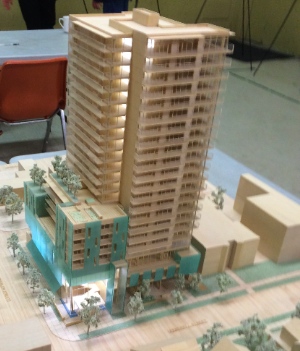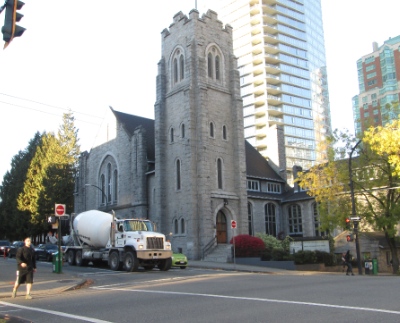
Coastal Church took advantage of the airspace above its building to secure its position in the pricey downtown core. Photo by Dave Koop.
Urban churches are beginning to realize the treasure they have, not just in their pews, but hovering high above their buildings. ‘Air rights’ focus on the space above the church building, and Christians now take in the reality that owning a building embraces a legal code which has existed since the 13th century.
That legal code, translated from Latin, means “whoever owns the soil, holds title all the way up to the heavens and down to the depths of hell.” Until the invention of the airplane forced limitations on this code, the potential overhead was limitless.
Selling air rights
Air rights can be bought or sold. For example, air rights can be transferred to a developer in a dense downtown area. A two-storey church could own 30 or 40 stories of airspace. This empty space may be worth cash to the church and extra height for another builder. The potential price of a property may be increased if the air space is considered.
Located in a heritage building built in 1919, downtown Vancouver’s Coastal Church is today nestled in the shadow of Vancouver’s tallest building – the 62-storey, $350 million, Shangri-La Hotel. Coastal Church began when pastors Dave and Cheryl Koop led a group of students from the World Harvest School of Ministry to witness in Vancouver’s West End back in 1993. Small groups quickly formed the backbone of the new work in 1994.
In 2001 they moved into their current location on West Georgia, a pricey area in Vancouver’s business district. Coastal Church came together with the City of Vancouver and developer Ian Gillespie to negotiate a three-way win: the city preserved a heritage site; the church underwent a $4.4 million renovation and considerably lessened its mortgage; and Gillespie helped the Kuok Group gain permission to surpass the 200-metre ceiling downtown.
This was accomplished by Coastal Church selling 50,000 square acres of density, which the developer was able to resell for $2,000 a square foot. Koop encourages churches to “not be afraid to negotiate with the future in mind.”
Heart for the City
More recently, First Baptist Church, located downtown on Burrard Street, took similar action to upgrade their heritage building.
On May 26, 2013, First Baptist leadership announced to the congregation that they had signed an agreement with Westbank to “seismically upgrade, renovate and restore First Baptist’s 102 year old heritage building and expand its facilities to be more effective in serving the church community, the neighbourhood and the city, as it has done for the past 122 years.”
Westbank was founded in 1992 by Gillespie, known for his Gesamtkunstwerk (total work of art) slogan.
This ‘Heart for the City Project’ will include market and non-market rental housing. First Baptist’s senior minister, Darrell Johnson, has stated:
Over the past decades, the church leadership has slowly been buying the lands adjacent to First Baptist Church along Nelson Street. Two years ago, with the completion of the new YMCA complex, the last piece fell into place, allowing FBC to own five contiguous lots. Now the church has been given the opportunity to make its resources available to bless the city in ways no one ever dreamed possible!
Serving neighbours
First Baptist’s executive advisor, Carson Pue, says there are 79,000 residents and 145,000 workers downtown they want to serve. Utilizing building space is about good stewardship.
Pue encourages “churches to never give up their property. . . . If we wanted to move out to the suburbs we could have built an enormous new campus for a church. But that would mean abandoning the building, the presence and the sacred space we have downtown. If we give up public space, it will not be regained and likely lost forever. This will undermine quality of life.”
Vancouver has the fourth highest population density in North America, with more residential high rises per capita than any other city whose population exceeds one million. About 650 skyscrapers cap off at over 35 metres and more than four dozen exceed 100 metres.
Pue admits that “downtown is one of the most challenging, complex and exciting places to minister in the city. It is not for the faint of heart! . . . Issues regarding livability, affordability, environmental sustainability and economic vitality surround us. Amidst all of this our neighbours do actually struggle with spiritual challenges and many long for a place where they can come and seek God in the craziness of downtown.”
Transferable development rights

Central Presbyterian Church has received final rezoning approval for its redevelopment, but still has to arrange for temporary facilities for the many activities in the church before construction can begin.
Central Presbyterian Church, built in 1975, is also in the arena with the proposal of building a 22-storey tower, including non-market residential housing, on its 17,000 square foot property at Thurlow and Pendrell.
Bosa Development is partnering with the church in this vision, which will see the church occupy the bottom three floors of the complex.
The practice of transferable development rights (TDR) assists city planners when issues of zoning, strategic planning and land control impact land management.
Historic churches can preserve and redevelop their sites with cash gifts from developers willing to purchase the space the church owns overhead in exchange for agreement that the church won’t build up. The existence of TDR credit banks allows development rights to be stored and even used in a more suitable jurisdiction if that is necessary.
Christ Church Cathedral leased its density so it could be added to another development in downtown Vancouver. Holy Trinity Cathedral, located near a SkyTrain station in New Westminster, plans to develop the land next to the cathedral into a condominium tower, beginning in 2016. South Cambie Gospel Hall (the Church of God in Vancouver) is taking advantage of the increased density along the Cambie corridor Canada Line to redevelop its property with a worship centre on the bottom floor and rentable condos above.
This article is re-posted by permission from The Light Magazine.

